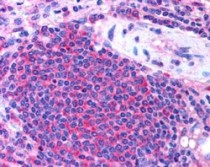ARG64146
anti-STS2 / TULA antibody
anti-STS2 / TULA antibody for IHC-Formalin-fixed paraffin-embedded sections and Human
Cell Biology and Cellular Response antibody
Overview
| Product Description | Goat Polyclonal antibody recognizes STS2 / TULA |
|---|---|
| Tested Reactivity | Hu |
| Predict Reactivity | Dog |
| Tested Application | IHC-P |
| Specificity | This antibody is expected to recognize both reported isoforms (NP_061834.1 and NP_001001895.1). |
| Host | Goat |
| Clonality | Polyclonal |
| Isotype | IgG |
| Target Name | STS2 / TULA |
| Antigen Species | Human |
| Immunogen | QQCSTPDGKYYRPD |
| Conjugation | Un-conjugated |
| Alternate Names | TULA; Cbl-interacting protein 4; STS-2; Ubiquitin-associated and SH3 domain-containing protein A; T-cell ubiquitin ligand 1; TULA-1; Suppressor of T-cell receptor signaling 2; CLIP4 |
Application Instructions
| Application Suggestion |
|
||||
|---|---|---|---|---|---|
| Application Note | IHC-P: Antigen Retrieval: Steam tissue section in Citrate buffer (pH 6.0). * The dilutions indicate recommended starting dilutions and the optimal dilutions or concentrations should be determined by the scientist. |
Properties
| Form | Liquid |
|---|---|
| Purification | Purified from goat serum by antigen affinity chromatography. |
| Buffer | Tris saline (pH 7.3), 0.02% Sodium azide and 0.5% BSA. |
| Preservative | 0.02% Sodium azide |
| Stabilizer | 0.5% BSA |
| Concentration | 0.5 mg/ml |
| Storage Instruction | For continuous use, store undiluted antibody at 2-8°C for up to a week. For long-term storage, aliquot and store at -20°C or below. Storage in frost free freezers is not recommended. Avoid repeated freeze/thaw cycles. Suggest spin the vial prior to opening. The antibody solution should be gently mixed before use. |
| Note | For laboratory research only, not for drug, diagnostic or other use. |
Bioinformation
| Database Links |
Swiss-port # P57075 Human Ubiquitin-associated and SH3 domain-containing protein A |
|---|---|
| Background | This gene encodes one of two family members belonging to the T-cell ubiquitin ligand (TULA) family. Both family members can negatively regulate T-cell signaling. This family member can facilitate growth factor withdrawal-induced apoptosis in T cells, which may occur via its interaction with AIF, an apoptosis-inducing factor. Alternative splicing of this gene results in multiple transcript variants. [provided by RefSeq, Aug 2011] |
| Research Area | Cell Biology and Cellular Response antibody |
| Calculated MW | 74 kDa |
Images (1) Click the Picture to Zoom In






